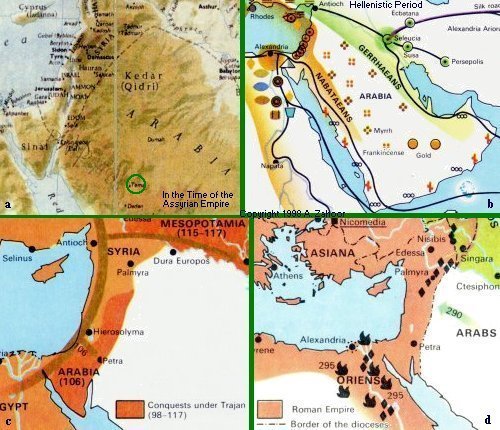The Region of Kedar and Ancient Arabia

We can now begin to put together the complete "picture" which emerges from the Bible and come up with a very specific, graphic portrait of the messenger whose prominent characteristics are twofold: 1. He would be the last one, and 2. He would be universal. According to the information given in the Old and New Testaments, this prophet would:
(i) be firm but merciful
(ii) establish a community based
on justice
(iii) be a light for all the nations
(iv) be associated with Qaydar;
(All based on Isaiah 42:1-11)
(v) be a descendant of ishmael,
a "brother" to the Hebrews
(vi) fulfill the promises made
to Abraham and Ishmael to
a. serve
as a blessing to all the nations
b. establish
the Arabs as a "great nation"
c. inherit
the "double portion" of honor;
(vii) receive revelation directly
from God; (All based on genesis 17:20; 22:16-18; Deuteronomy 21:15-17)
(viii) come after Jesus' mission
was ended
(ix) comfort and counsel mankind
(paraclete), for which he would be known as the praised one (periclyte)
(x) be outstanding for his truthfulness
(xi) receive word directly from
God
(xii) deliver "all the truth",
the whole truth
(xiii) have a ministry of lasting
effect
(xiv) glorify Jesus (All based
on John 14:16, 17 and 16:13, 14)
To refine these points for still
clearer focus, the last prophet would differ from all the others in at
least three vital aspects:
1. He would have a universal mission
2. He would be the seal of the
prophets
3. He would be an Arab, and of
the 12 sons of Ishamael, he would have to come in the line of Qaydar.
The Region of Kedar and Ancient Arabia

Now, would it be possible for any one man to fit this "picture" completely? Unless he could fulfill all the requirements, he would not be the prophet promised by the scriptures. The possibility for any one man to meet all these criteria, purely by chance, is inconceivable. It would be impossible also for anyone to cause himself deliberately to meet them all. For example, who can control the question of who his ancestors will be? For the sake of argument, let us suppose that an Arab wanted, of his own desire, to be this prophet. But he could have descended from any of the other 11 sons of Ishmael. Perhaps he would have wanted to curry the favor or support of his own tribe, and thus he would have preached tribalism or nationalism rather than universalism. Or perhaps he would never even think of mentioning Jesus in his message, or would have agreed with the Jews that Jesus was but an imposter and troublemaker. Perhaps he would die before gaining a following or establishing a cohesive community. There are too many possibilities for anyone to consciously control all the criteria presented in the Bible for identifying the last prophet. Then there is the problem that the Bible was not translated into Arabic until the tenth century C.E., so no Arab living before the year 1000 would have had the opportunity to examine the written text of the Bible in his own language [21]. Only God Almighty could have caused all these diverse elements necessary to come to frution in one specific human being.
The fact is that one man, and only
one man did answer to all the proper conditions, namely, Muhammad bin 'Abdullah,
may God grant him blessings and peace. The preview of him in the Torah
and the Gospel is clear and undeniable, despite the errors and dogmatism
of some copyists of the scripture.
The following is a direct photo-copy from page 567 of The Gospel of John, A Commentary, by Rudolf Bultmann, German Christian theologian, 1971, The Westminister Press, Philadelphia, USA (A translation of the German edition of 1964, Das Evangelium des Johannes). It shows that the views of this well-known Christian Scholar are identical with the views expressed on page 6 of this article.
